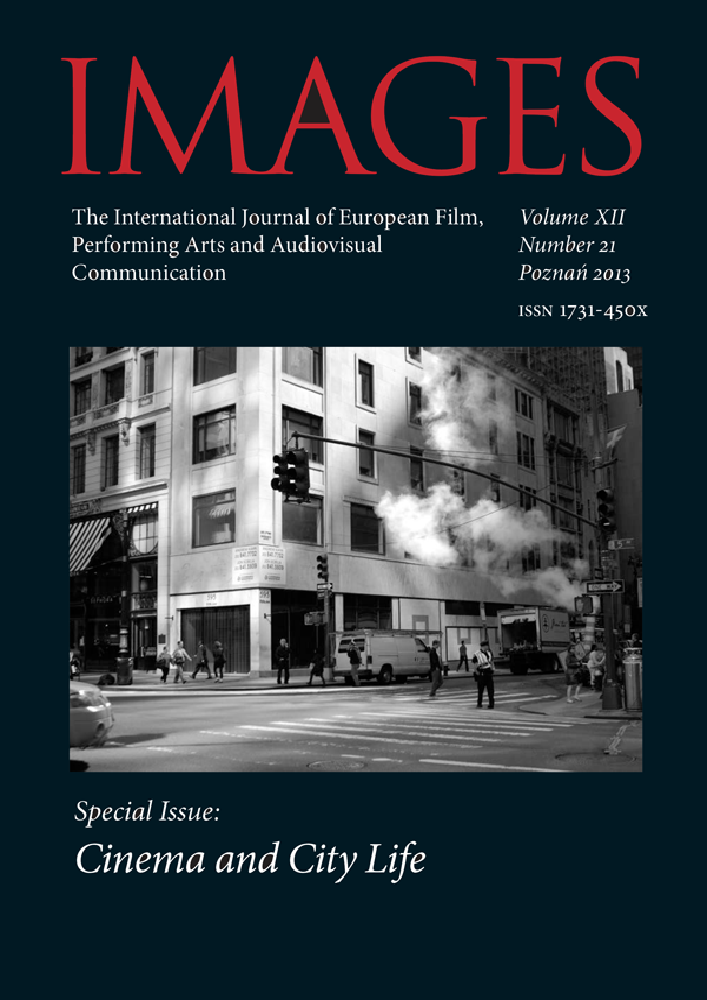Abstrakt
Underwater, cosmic, spiritual. Russian cities in Scandinavian documentaries
The article discusses three documentaries made since 2000 by Scandinavian filmmakers: the Finnish director Marja Pensala’s The Eclipse of the Soul (2000) and two films by Danish authors: Boris Bertram’s Tankograd (2010) and Ada Bligaard Søby’s The Naked of Saint Petersburg (2010). All the films are portraits of Russian cities and their residents. In my study, I draw on concepts such as the “Russian soul”, private/public and bytie (the spiritual being)/byt (the daily grind), which, as I argue, are important aspects of all three films, and at the same time, useful tools for their analysis. Common to these documentaries is the fact that the authors direct their attention to the asymmetrical relation between the state’s position of power and its largely powerless citizens. The constitutive element of a city as such – being a public space, i.e. a space to which all people should have equal access and rights – appears largely distorted. As a consequence, the residents escape from their stark reality to create alternative, imaginary spaces – be it a lost paradise, like the underwater city of Mologa in Pensala’s film, a cosmic heterotopia, like the space of art in Bertram’s Tankograd, or a spiritual universe, like in Søby’s short documentary. In all these films, the directors’ point of reference – their cultural perspective – is emphasized as a filter, through which the Russian reality is perceived.
Artykuł omawia trzy skandynawskie filmy dokumentalne: Zaćmienie duszy (2000) fińskiej reżyserki Marji Pensali, Tankograd (2010) autorstwa Duńczyka Borisa Bertrama oraz Nadzy z Petersburga (2010) w reżyserii duńskiej twórczyni Ady Bligaard Søby. Każdy z dokumentów to portret wybranego miasta w Rosji i jego mieszkańców. Odwołując się do koncepcji takich jak „rosyjska dusza”, bytie/byt oraz sfera publiczna/prywatna, istotnych dla samych filmów i stanowiących zarazem narzędzie analizy i refleksji, artykuł podejmuje przedstawiony przez skandynawskich twórców problem asymetrycznej relacji między skupioną w rękach państwa władzą a zwykłymi obywatelami. Sfera publiczna konstytuująca miasto, do której obywatele powinni mieć w miarę możliwości równy dostęp, jawi się w omawianych dokumentach jako wysoce skrępowana. Bohaterowie filmów tworzą w konsekwencji własne, wyobrażone przestrzenie: dokument Pensali ukazuje zatopione miasto Mołogę przekształcone poprzez pracę pamięci w utracony raj, w filmie Bertrama przestrzeń sztuki przetworzona zostaje w kosmiczną heterotopię, a w portrecie Ady Søby wędrówki po Petersburgu w towarzystwie jego mieszkańca obrazują metropolię jako duchowe uniwersum. W każdym z dokumentów twórcy zwracają uwagę odbiorców na kulturowe filtry, dzielące ich od portretowanej rosyjskiej rzeczywistości.
Licencja
Copyright
© 2013 Uniwersytet im. Adama Mickiewicza w Poznaniu
OPEN ACCESS
